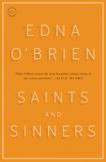Irish Gothic
Every year, speculation swirls that brand-name authors such as Philip Roth or Amos Oz or Haruki Murakami will finally win the Nobel Prize for Literature. Why is Ireland’s Edna O’Brien, now 80 years old, never included in this elite group?
O’Brien is one of the most respected fiction writers of her generation, but that is merely the tip of her Nobel credentials. She hails from a post-colonial nation and has challenged cherished mores and taboos of that nation. Her fiction confronts hot-button topics, including terrorism and abortion, and she has been both provocative and substantive on the complicated topic of sexuality.
It is also worth noting that only 12 women have won the Nobel since the Swedish Academy began handing out the literary prize in 1901.
O’Brien’s latest book, a collection of stories entitled Saints and Sinners, can only serve to boost her credentials for any major literary award. The diversity of topics and characters explored in this collection will be familiar to O’Brien’s fans, yet I should add that they are positively dizzying in their breadth and richness.
“Black Flower” is a bleak romance about a woman dating an IRA man just out of prison. “Shovel Kings” is a long study of Irish laborers in London. “Manhattan Medley” has the gleam and fizz of a (dark and literary) episode of “Sex and the City.” And “Green Georgette” is a closely-observed study of class and manners with a conclusion that puts a new spin on the famous Edward Arlington Robinson poem “Richard Cory.”
The cumulative effect of this can be disorienting, but only in the most impressive way. Moving from one story to the next, you can feel as if you are reading works by different authors. This is simply because O’Brien is capable of moving so deftly from the romantic to the grotesque, from the everyday to the gothic.
“Shovel Kings” begins “in a massive pub named Biddy Mulligan’s, in North London, on St. Patrick’s Day.” The female narrator happens upon Rafferty (the subject of this complex story) and asks why he wears a harp pin. “To prove that I’m an Irishman,” Rafferty replies. What could veer off into snide satire, however, becomes a heady meditation on identity, alienation and assimilation.
As Rafferty’s friend puts it later: “‘He doesn’t belong in England and ditto Ireland,’ …and, tapping his temple to emphasize his meaning, added that exile is in the mind and there’s no cure for that.”
The realism of “Shovel Kings” gives way to feverish works like “Plunder,” a sort of nightmare about a rural town suddenly invaded by “rampaging soldiers” and their “huge dogs.” The unnamed narrator longs to challenge the “hooligans in their camouflage.”
O’Brien writes: “How beautiful it would be if one of us could step forward and volunteer to become the warrior for the others. What a firmament of love ours would be.” But this is no heroic Irish epic about victory over the oppressed or even noble defeat. The story, instead, slides inexorably toward its horrific conclusion.
O’Brien also revisits, in this collection, the semi-autobiographical turf she explored in her 2006 novel, The Light of the Evening, a book dedicated to her “mother and motherland.” In that book, O’Brien explored a mother who fiercely disapproves of her daughter’s writing career, which has been marked by frank sexuality and love of, yet criticism toward, Ireland. (Sound familiar?) In the new story “My Two Mothers,” a daughter is told “literature [is] the precursor to sin and damnation.”
Dream imagery also pervades “My Two Mothers.” Early in the story the slumbering narrator offers this: “My mother’s hand is on the razor and then her face comes into view, swimming as it were towards me, pale, pear-shaped, about to mete out its punishment, to cut the tongue out of me.”
Again and again, however, O’Brien resists sliding into rage. Her career could have been spent lamenting, or flatly ignoring, Ireland. She examines it, instead, with sympathy and honor and, yes, rage, but also wit. (The domineering parent in “My Two Mothers” says: “Life…was one big battle. Because no matter who wins, no one wins.”)
In an illuminating interview with Patricia Harty of Irish America magazine (included at the end of Saints and Sinners), O’Brien says this about her mother: “She disapproved of writing and feared the written word, feared that its essence was sinful….And yet as you can see from her letters, she was a born writer herself.”
O’Brien may or may not be comfortable with such contradictions, but she has made great art out of them for five decades now.
It might have been interesting if Saints and Sinners could also have included another recent work by O’Brien, entitled “A Poem for Barack.”
This poem may not be everyone’s taste. (“You glided on/ A swank/ With a lava of language,/ Prince Hamlet himself in Illinois.”) But it is about confronting adversity with art and dignity, themes O’Brien has explored her entire literary life.
It is also worth noting that Barack Obama was once awarded a Nobel Prize.
This article also appeared in print, under the headline “Irish Gothic,” in the November 14, 2011, issue.








